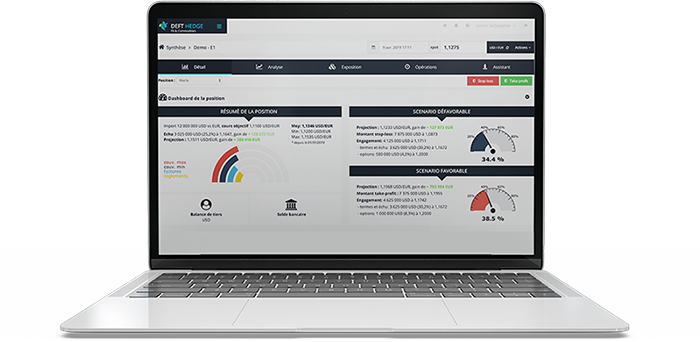Evolution of aluminium prices :
Discover our solution !

Depending on your activity, you may have to buy or sell aluminium on the raw materials market. As with other products listed on this market, the value of aluminium is highly volatile and is influenced by various factors. In order to optimise your transactions on this market and minimise the risks associated with these financial exchanges, it is important to adopt good raw materials management. In order to fully understand the value of aluminium on the markets, we return to this raw material in detail here.
To help you with your strategy for buying or selling aluminium on the international markets, DeftHedge is at your side to provide you with all the information you need to manage your transactions. Indeed, our SaaS solution has numerous functionalities to establish the right strategy and be perfectly informed on the evolution of aluminium prices. In order to anticipate changes in the price of aluminium and adapt your strategy as best as possible, discover all the advantages of DeftHedge for raw materials management here.
What is the aluminium price ?
Before looking at his course, it is worthwhile to go back over the characteristics and use of aluminium. Produced from bauxite ore, aluminium is a particularly light and malleable raw material, widely used in various sectors of activity: automotive, electromechanical, aeronautics, chemicals, packaging, etc. The manufacture of this metal requires a significant amount of energy, a criterion that directly links the price of this material to that of oil and electricity in particular.
The price of aluminium is therefore influenced by various factors that imply volatility in its value. Like many precious metals, the reference price for aluminium is set by the London Metal Exchange (LME). In fact, this market represents nearly 80% of world trade for transactions in “non-ferrous” metals such as aluminium. In order to best track the evolution of the value of this raw material, it is therefore appropriate to refer to this market.
What are the different aluminium quotation markets ?
As mentioned above, aluminium transactions are mainly carried out on the London Metal Exchange (LME). Officially founded in 1877, this market specialises in the trading of futures contracts on non-ferrous metal transactions.
Thanks to futures contracts, price fluctuation risks are better managed by the players in this market.
Other products such as futures and options are also offered on the LME. At the level of transaction trading, it can take several forms :
At auction
By phone
By electronic platform
What are the quotation methods for aluminium?
Unlike other futures markets such as NYMEX or ICE, the London Metal Exchange does not have the same product quotation system.
While other futures markets operate with monthly quotes, the LME has a date-based quoting system.
In this market, products are quoted daily with a fixed three-month detail.
What factors influence the price of aluminium ?
The reference value for aluminium transactions is therefore set by the London Metal Exchange (LME). This value is not fixed and may vary significantly depending on a number of factors:
Supply and demand
Economic climate
Production capacity
Value of the dollar
Investor expectations and behaviour
Aluminium quality
Manufacturing cost
Cost of transport and insurance
For aluminium transactions, all these elements will therefore be taken into account in order to best assess the value and final cost of aluminium. In order to minimise the risk of financial losses, forward contracts are therefore signed between the players in this market.
What is the global evolution of aluminium ?
Aluminium is one of the most widely used raw materials in the world and is therefore the subject of numerous transactions. Most of the production of this material is carried out in China, with Russia and Canada among the main producing countries.
On the raw materials market, aluminium is the subject of numerous transactions that are directly impacted by the various factors mentioned above.
In order to ensure its price for both buyers and sellers, the majority of transactions are carried out through the signing of forward contracts.
What are the advantages of the futures market for aluminium ?
The raw materials market is particularly volatile and the value of individual products can vary significantly over short periods of time.
Faced with these fluctuation risks, players therefore seek to protect themselves as much as possible. Thanks to the futures market, the players involved in a transaction agree on a price with payment and delivery at a later date.
Setting this price thus enables them to protect themselves against possible increases or decreases in the value of aluminium. This type of contract has advantages for both buyers and sellers.
For aluminium sellers, forward contracts give them the assurance of selling their production, even before it is produced, at a fixed price.
In the event that the value of aluminium falls between the time the contract is signed and the actual payment, this will ensure that sellers are not impacted by this devaluation. Conversely, if the price of aluminium increases during the same period, the seller will not be able to benefit from this increase in value.
The forward contract therefore enables sellers to protect themselves against the risk of a loss in aluminium value.
For buyers, forward contracts are also advantageous, since they can negotiate the purchase price of the aluminium beforehand.
This prior negotiation of the price enables them to anticipate a possible increase in the value of aluminium. By signing a forward contract, the buyer is thus assured of the purchase price and thus of the budget required to carry out the transaction.
However, in the event of a drop in aluminium prices, he will not be able to benefit from it.
How will the DeftHedge solution help you with aluminium price monitoring ?
Dedicated to professionals, our SaaS software enables you to improve and perfect the day-to-day management of your business, and in particular the monitoring of aluminium prices.
Like other raw materials, aluminium is a product whose value can vary greatly over a short period of time.
Indeed, many elements can impact its price, a point that must therefore be taken into account in your transactions on world markets.
To help you track the price and trends of aluminium, DeftHedge provides you with a particularly comprehensive solution with adapted functionalities:
Management of aluminium price trends
Automation of certain recurring tasks
Definition of financial strategies
Centralising and securing your financial data
Optimisation of financial operations and reduction of losses
Thanks to these numerous functionalities, DeftHedge software proves to be an indispensable tool for the daily management of your equity portfolio on the commodities market and in particular for aluminium transactions.
In order to help professionals as much as possible to establish and orient their strategy on the markets, our financial forecasting software consists of an action plan simulator: “SmartStrategy”.
Thanks to this functionality, professionals can determine in advance the various effects of the strategies they wish to implement and thus perfect their positioning on the aluminium market as much as possible.
DeftHedge: a valuable aid for your strategy on the aluminium market
Transactions on the commodities market involve real risks in financial terms and therefore require an effective strategy to minimise possible losses.
DeftHedge is therefore there to help you choose the most opportune moments to make your sales or purchases of aluminium on this market.
Thanks to DeftHedge’s accurate monitoring of aluminium prices, you will be able to considerably improve your strategy on the financial markets.
To carry out the best transactions on the London Metal Exchange, don’t hesitate to opt for our commodity transaction management solution. This will provide you with real decision-making support and protect you against the risk of financial losses.
You will soon be able to feel the beneficial effects of using this tool on your finances with a reduction in your losses on the aluminium market.
Much more than a simple management tool, DeftHedge proves to be a central software for your daily decisions.
In order to make it as easy as possible for you to get to grips with our SaaS solution and to help you customise this tool, the DeftHedge experts remain at your disposal to guide you and give you all the right advice.
In order for our solution to be as beneficial as possible for your business, it is essential that you can easily use all the functionalities offered by our financial forecasting software.
From now on, don’t hesitate to get in touch with our teams and obtain a software perfectly adapted to the management and monitoring of aluminium prices.
